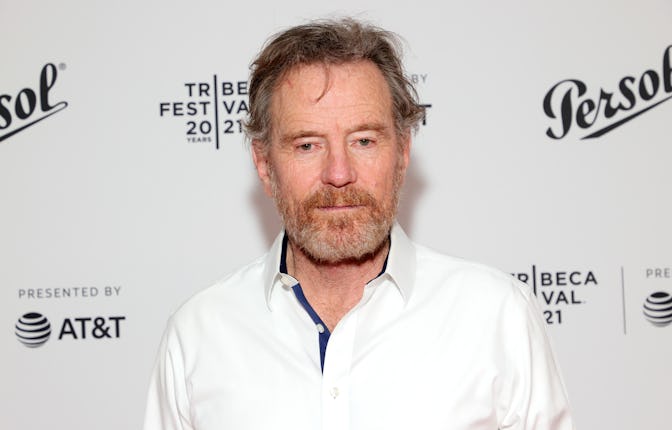Bryan Cranston copped to “white blindness” and it actually felt pretty genuine
Plenty of white people say they’ll “do the work.” Bryan Cranston is actually doing it.

Many revere actor Bryan Cranston for his on-screen transformation from a high school teacher into a chaotic neutral meth lord on the hit show Breaking Bad. And if a recent conversation is any indication, he’s going through personal development as well, as he publicly wrestles with the implications of whiteness and allows such revelations to inform his artistic choices.
In a candid interview with the Los Angeles Times, Cranston details the social realities he’s recently been trying to thoughtfully face — given the hard truths that the pandemic, the Trump years, and the 2020 resurgence of the Black Lives Matter Movement have given us all to sit with. He utters what we all long to hear our Boomer relatives say: “I’m 65 years old now, and I need to learn, I need to change,” he told the Times. And for once in the grand scheme of public displays of white remorse, it feels very genuine — probably because he’s taking real action behind the sentiment, and trying to spark thoughtful introspection with his work.
Cranston had been set to direct a production of the 1984 Larry Shue play The Foreigner at LA’s Geffen Playhouse. The Foreigner — a slapstick play in which an Englishman defends a fishing lodge from becoming a Ku Klux Klan meeting house — won Best American Play in the Outer Critics Circle Awards at its nascence. But its life as a play is a prime example of the innocuous ways people can perpetuate antiquated perspectives, even with the best of intentions. What was once seen as a progressive piece of theater is now an outdated relic of 1980s meditations on the white savior, and fortunately, Cranston realized that.
“It is a privileged viewpoint to be able to look at the Ku Klux Klan and laugh at them and belittle them for their broken and hateful ideology,” he told the Times. “But the Ku Klux Klan and Charlottesville and white supremacists — that’s still happening and it’s not funny. It’s not funny to any group that is marginalized by these groups’ hatred, and it really taught me something.”
Cranston attributes his initial amusement at The Foreigner to what he calls his “white blindness,” but he was eventually drawn to deeper self-examination. “I realized, ‘Oh my God, if there’s one, there’s two, and if there’s two, there are 20 blind spots that I have … what else am I blind to?” he added. “If we’re taking up space with a very palatable play from the 1980s where rich old white people can laugh at white supremacists and say, ‘Shame on you,’ and have a good night in the theater, things need to change, I need to change.”
Cranston decided to shift away from his plans for The Foreigner, and to instead play Charles Nichols in the same theater company’s West Coast premiere of Power of Sail. In the play, written by Paul Grellong, Nichols is a Harvard professor who invites a Holocaust-denying white nationalist to speak at his symposium, causing extreme backlash and allowing the production to delve into the complexities of free speech. Cranston said of the play’s lessons, “There need to be barriers, there need to be guard rails. ... If someone wants to say the Holocaust was a hoax, which is against history … to give a person space to amplify that speech is not tolerance. It’s abusive.” Power of Sail runs through March 20 in Los Angeles.